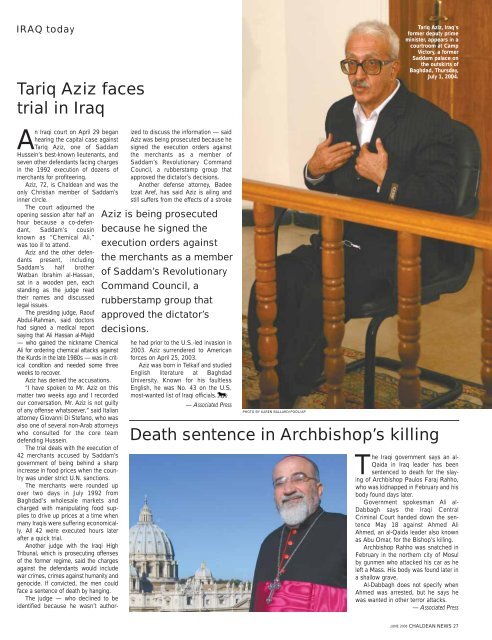JUNE 2008
cn0608_0156
cn0608_0156
You also want an ePaper? Increase the reach of your titles
YUMPU automatically turns print PDFs into web optimized ePapers that Google loves.
IRAQ today<br />
Tariq Aziz faces<br />
trial in Iraq<br />
Tariq Aziz, Iraq's<br />
former deputy prime<br />
minister, appears in a<br />
courtroom at Camp<br />
Victory, a former<br />
Saddam palace on<br />
the outskirts of<br />
Baghdad, Thursday,<br />
July 1, 2004.<br />
An Iraqi court on April 29 began<br />
hearing the capital case against<br />
Tariq Aziz, one of Saddam<br />
Hussein’s best-known lieutenants, and<br />
seven other defendants facing charges<br />
in the 1992 execution of dozens of<br />
merchants for profiteering.<br />
Aziz, 72, is Chaldean and was the<br />
only Christian member of Saddam’s<br />
inner circle.<br />
The court adjourned the<br />
opening session after half an<br />
hour because a co-defendant,<br />
Saddam’s cousin<br />
known as “Chemical Ali,’’<br />
was too ill to attend.<br />
Aziz and the other defendants<br />
present, including<br />
Saddam’s half brother<br />
Watban Ibrahim al-Hassan,<br />
sat in a wooden pen, each<br />
standing as the judge read<br />
their names and discussed<br />
legal issues.<br />
The presiding judge, Raouf<br />
Abdul-Rahman, said doctors<br />
had signed a medical report<br />
saying that Ali Hassan al-Majid<br />
— who gained the nickname Chemical<br />
Ali for ordering chemical attacks against<br />
the Kurds in the late 1980s — was in critical<br />
condition and needed some three<br />
weeks to recover.<br />
Aziz has denied the accusations.<br />
“I have spoken to Mr. Aziz on this<br />
matter two weeks ago and I recorded<br />
our conversation. Mr. Aziz is not guilty<br />
of any offense whatsoever,’’ said Italian<br />
attorney Giovanni Di Stefano, who was<br />
also one of several non-Arab attorneys<br />
who consulted for the core team<br />
defending Hussein.<br />
The trial deals with the execution of<br />
42 merchants accused by Saddam’s<br />
government of being behind a sharp<br />
increase in food prices when the country<br />
was under strict U.N. sanctions.<br />
The merchants were rounded up<br />
over two days in July 1992 from<br />
Baghdad’s wholesale markets and<br />
charged with manipulating food supplies<br />
to drive up prices at a time when<br />
many Iraqis were suffering economically.<br />
All 42 were executed hours later<br />
after a quick trial.<br />
Another judge with the Iraqi High<br />
Tribunal, which is prosecuting offenses<br />
of the former regime, said the charges<br />
against the defendants would include<br />
war crimes, crimes against humanity and<br />
genocide. If convicted, the men could<br />
face a sentence of death by hanging.<br />
The judge — who declined to be<br />
identified because he wasn’t authorized<br />
to discuss the information — said<br />
Aziz was being prosecuted because he<br />
signed the execution orders against<br />
the merchants as a member of<br />
Saddam’s Revolutionary Command<br />
Council, a rubberstamp group that<br />
approved the dictator’s decisions.<br />
Another defense attorney, Badee<br />
Izzat Aref, has said Aziz is ailing and<br />
still suffers from the effects of a stroke<br />
Aziz is being prosecuted<br />
because he signed the<br />
execution orders against<br />
the merchants as a member<br />
of Saddam’s Revolutionary<br />
Command Council, a<br />
rubberstamp group that<br />
approved the dictator’s<br />
decisions.<br />
he had prior to the U.S.-led invasion in<br />
2003. Aziz surrendered to American<br />
forces on April 25, 2003.<br />
Aziz was born in Telkaif and studied<br />
English literature at Baghdad<br />
University. Known for his faultless<br />
English, he was No. 43 on the U.S.<br />
most-wanted list of Iraqi officials.<br />
— Associated Press<br />
PHOTO BY KAREN BALLARD/POOL/AP<br />
Death sentence in Archbishop’s killing<br />
The Iraqi government says an al-<br />
Qaida in Iraq leader has been<br />
sentenced to death for the slaying<br />
of Archbishop Paulos Faraj Rahho,<br />
who was kidnapped in February and his<br />
body found days later.<br />
Government spokesman Ali al-<br />
Dabbagh says the Iraqi Central<br />
Criminal Court handed down the sentence<br />
May 18 against Ahmed Ali<br />
Ahmed, an al-Qaida leader also known<br />
as Abu Omar, for the Bishop’s killing.<br />
Archbishop Rahho was snatched in<br />
February in the northern city of Mosul<br />
by gunmen who attacked his car as he<br />
left a Mass. His body was found later in<br />
a shallow grave.<br />
Al-Dabbagh does not specify when<br />
Ahmed was arrested, but he says he<br />
was wanted in other terror attacks.<br />
— Associated Press<br />
<strong>JUNE</strong> <strong>2008</strong> CHALDEAN NEWS 27

















